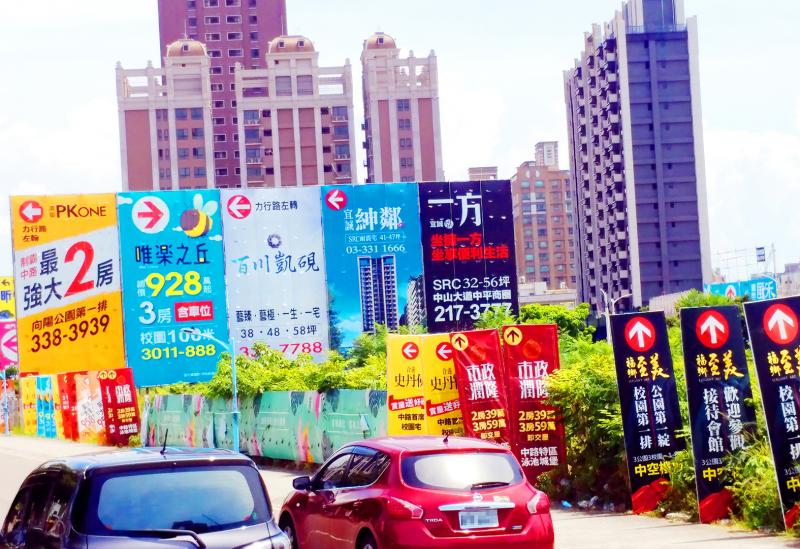Property transactions last month totaled 21,712 units in the nation’s six special municipalities, shrinking 10.9 percent from a month earlier due to government plans to cool the market and fewer working days, real-estate brokers said on Monday.
The volume was an increase of 0.8 percent from the same time last year, local government data showed.
Taichung was the only municipality to report that its number of deals increased, rising 18.3 percent month-on-month to 4,894, while transactions in Taipei, New Taipei City, Taoyuan, Tainan and Kaohsiung declined.

Photo: CNA
Taichung fared well thanks to a spike in job opportunities after Taiwanese companies shifted some manufacturing facilities back home from China, Evertrust Rehouse Co (永慶房屋) spokesman Jay Hsieh (謝志傑) said.
Improving infrastructure, especially construction of the city’s mass rapid transit rail system, is attracting buyers with real demand and investment needs, Hsieh said.
That explained why housing prices in Taichung outpaced those elsewhere in Taiwan, a trend that drew the central bank’s attention, he said.
New Taipei City reported 5,549 transactions, while Taipei reported 2,699, translating into a monthly decline of 12.4 percent and 13.9 percent respectively.
Sinyi Realty Inc (信義房屋) attributed the retreat to last month’s fewer working days, as Taiwanese celebrated the Mid-Autumn Festival and Double Ten National Day, research manager Tseng Ching-der (曾敬德) said, adding that the situation would improve this month in the absence of holiday disruptions.
Taoyuan reported that property transactions fell 20.6 percent to 3,487 units, the weakest among the six municipalities.
Housing transactions totaled 1,860 in Tainan and 3,223 in Kaohsiung, dropping 12.7 percent and 8 percent respectively from a month earlier.
Evertrust said it suspected that talk of credit controls by policymakers to stop property price hikes pushed some buyers to the sidelines.
Tseng and Hsieh said they are expecting the housing market to remain stable for the rest of the year, as it is the high season for property sales.

With an approval rating of just two percent, Peruvian President Dina Boluarte might be the world’s most unpopular leader, according to pollsters. Protests greeted her rise to power 29 months ago, and have marked her entire term — joined by assorted scandals, investigations, controversies and a surge in gang violence. The 63-year-old is the target of a dozen probes, including for her alleged failure to declare gifts of luxury jewels and watches, a scandal inevitably dubbed “Rolexgate.” She is also under the microscope for a two-week undeclared absence for nose surgery — which she insists was medical, not cosmetic — and is

CAUTIOUS RECOVERY: While the manufacturing sector returned to growth amid the US-China trade truce, firms remain wary as uncertainty clouds the outlook, the CIER said The local manufacturing sector returned to expansion last month, as the official purchasing managers’ index (PMI) rose 2.1 points to 51.0, driven by a temporary easing in US-China trade tensions, the Chung-Hua Institution for Economic Research (CIER, 中華經濟研究院) said yesterday. The PMI gauges the health of the manufacturing industry, with readings above 50 indicating expansion and those below 50 signaling contraction. “Firms are not as pessimistic as they were in April, but they remain far from optimistic,” CIER president Lien Hsien-ming (連賢明) said at a news conference. The full impact of US tariff decisions is unlikely to become clear until later this month

GROWING CONCERN: Some senior Trump administration officials opposed the UAE expansion over fears that another TSMC project could jeopardize its US investment Taiwan Semiconductor Manufacturing Co (TSMC, 台積電) is evaluating building an advanced production facility in the United Arab Emirates (UAE) and has discussed the possibility with officials in US President Donald Trump’s administration, people familiar with the matter said, in a potentially major bet on the Middle East that would only come to fruition with Washington’s approval. The company has had multiple meetings in the past few months with US Special Envoy to the Middle East Steve Witkoff and officials from MGX, an influential investment vehicle overseen by the UAE president’s brother, the people said. The conversations are a continuation of talks that

CHIP DUTIES: TSMC said it voiced its concerns to Washington about tariffs, telling the US commerce department that it wants ‘fair treatment’ to protect its competitiveness Taiwan Semiconductor Manufacturing Co (TSMC, 台積電) yesterday reiterated robust business prospects for this year as strong artificial intelligence (AI) chip demand from Nvidia Corp and other customers would absorb the impacts of US tariffs. “The impact of tariffs would be indirect, as the custom tax is the importers’ responsibility, not the exporters,” TSMC chairman and chief executive officer C.C. Wei (魏哲家) said at the chipmaker’s annual shareholders’ meeting in Hsinchu City. TSMC’s business could be affected if people become reluctant to buy electronics due to inflated prices, Wei said. In addition, the chipmaker has voiced its concern to the US Department of Commerce